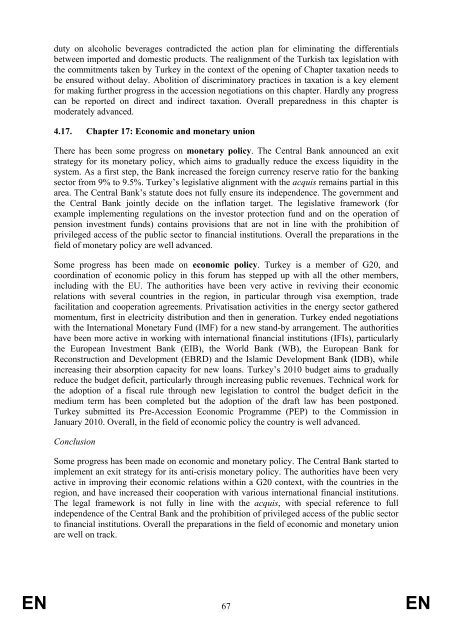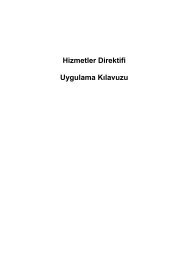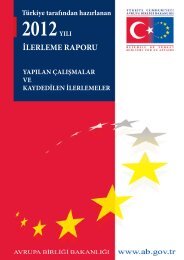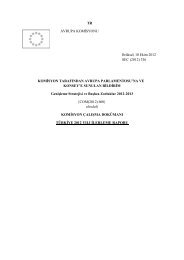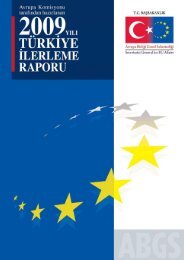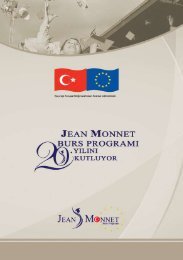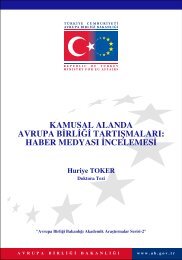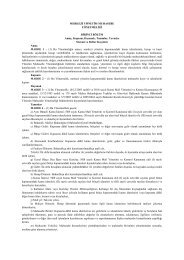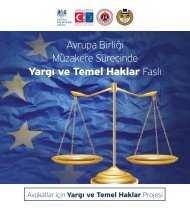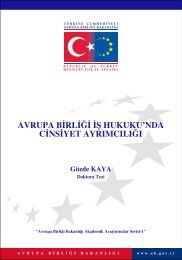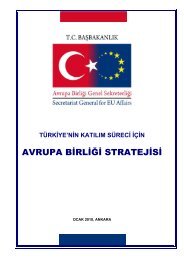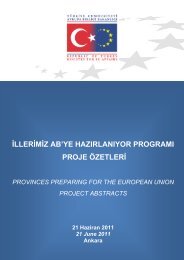2010 ilerleme raporu - Avrupa Birliği Bakanlığı
2010 ilerleme raporu - Avrupa Birliği Bakanlığı
2010 ilerleme raporu - Avrupa Birliği Bakanlığı
Create successful ePaper yourself
Turn your PDF publications into a flip-book with our unique Google optimized e-Paper software.
duty on alcoholic beverages contradicted the action plan for eliminating the differentialsbetween imported and domestic products. The realignment of the Turkish tax legislation withthe commitments taken by Turkey in the context of the opening of Chapter taxation needs tobe ensured without delay. Abolition of discriminatory practices in taxation is a key elementfor making further progress in the accession negotiations on this chapter. Hardly any progresscan be reported on direct and indirect taxation. Overall preparedness in this chapter ismoderately advanced.4.17. Chapter 17: Economic and monetary unionThere has been some progress on monetary policy. The Central Bank announced an exitstrategy for its monetary policy, which aims to gradually reduce the excess liquidity in thesystem. As a first step, the Bank increased the foreign currency reserve ratio for the bankingsector from 9% to 9.5%. Turkey’s legislative alignment with the acquis remains partial in thisarea. The Central Bank’s statute does not fully ensure its independence. The government andthe Central Bank jointly decide on the inflation target. The legislative framework (forexample implementing regulations on the investor protection fund and on the operation ofpension investment funds) contains provisions that are not in line with the prohibition ofprivileged access of the public sector to financial institutions. Overall the preparations in thefield of monetary policy are well advanced.Some progress has been made on economic policy. Turkey is a member of G20, andcoordination of economic policy in this forum has stepped up with all the other members,including with the EU. The authorities have been very active in reviving their economicrelations with several countries in the region, in particular through visa exemption, tradefacilitation and cooperation agreements. Privatisation activities in the energy sector gatheredmomentum, first in electricity distribution and then in generation. Turkey ended negotiationswith the International Monetary Fund (IMF) for a new stand-by arrangement. The authoritieshave been more active in working with international financial institutions (IFIs), particularlythe European Investment Bank (EIB), the World Bank (WB), the European Bank forReconstruction and Development (EBRD) and the Islamic Development Bank (IDB), whileincreasing their absorption capacity for new loans. Turkey’s <strong>2010</strong> budget aims to graduallyreduce the budget deficit, particularly through increasing public revenues. Technical work forthe adoption of a fiscal rule through new legislation to control the budget deficit in themedium term has been completed but the adoption of the draft law has been postponed.Turkey submitted its Pre-Accession Economic Programme (PEP) to the Commission inJanuary <strong>2010</strong>. Overall, in the field of economic policy the country is well advanced.ConclusionSome progress has been made on economic and monetary policy. The Central Bank started toimplement an exit strategy for its anti-crisis monetary policy. The authorities have been veryactive in improving their economic relations within a G20 context, with the countries in theregion, and have increased their cooperation with various international financial institutions.The legal framework is not fully in line with the acquis, with special reference to fullindependence of the Central Bank and the prohibition of privileged access of the public sectorto financial institutions. Overall the preparations in the field of economic and monetary unionare well on track.EN 67 EN


